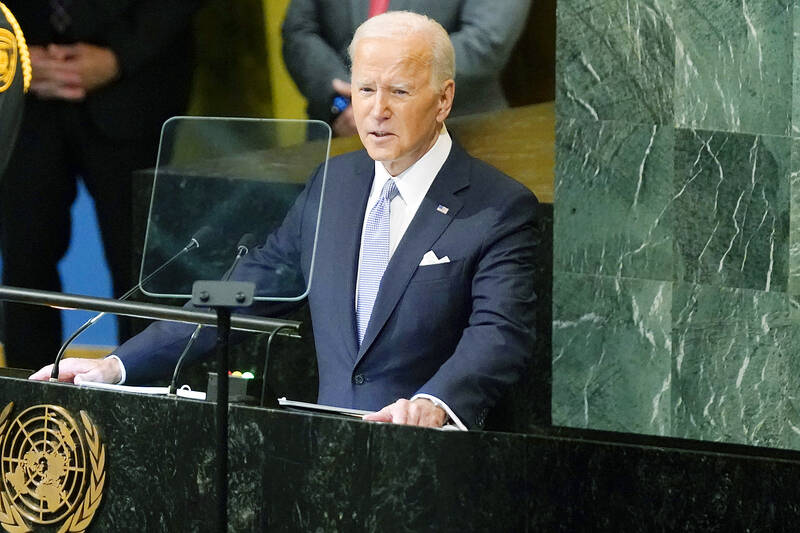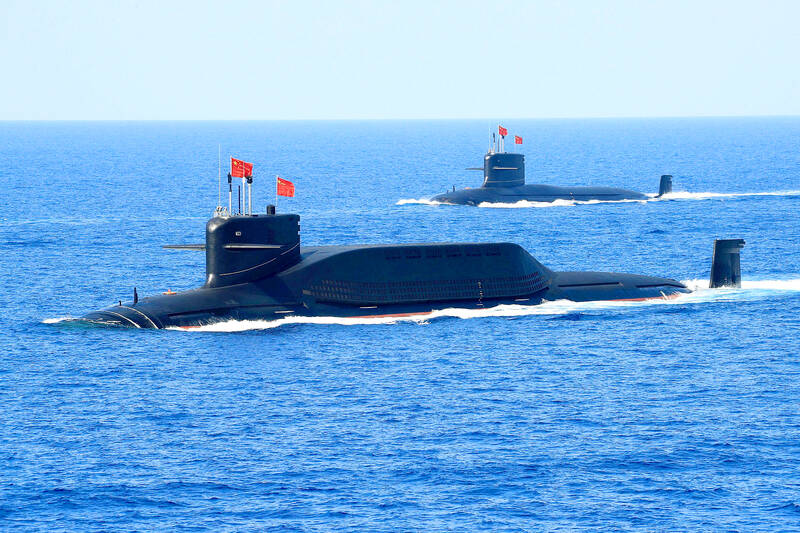A recent survey published in the generally useful Taiwan-US Quarterly Analysis series at Brookings titled “When might US political support be unwelcome in Taiwan?” (Alastair Iain Johnston, Tsai Chia-hung, and George Yin, April 5) explores the visit of then-house speaker Nancy Pelosi to Taiwan last year. It purports to show that Taiwanese feel the visit worsened Taiwan’s security.
A glance at their September 2022 question “In August this year, US Congress Speaker Nancy Pelosi visited Taiwan, and China immediately held large-scale military exercises around Taiwan. Do you think this is a serious threat to Taiwan’s security?” shows that it consists of two parts. Readers are invited to grapple with the issue of which part of the question those polled (on landlines, apparently) were attempting to answer. What’s the threat, Pelosi or China?
The survey’s own ideological position was signaled in its contention that the US “one-China” policy is being “hollowed out,” an ideological claim it treats as a fact. It frames the debate over US Taiwan policy as a “…discourse about how to deter the PRC (People’s Republic of China) emphasizes military tools over the synergistic effects of assuring Beijing that the United States is not encouraging or enabling formal Taiwanese independence.”

Photo: AP
SUPPORT FOR TAIWAN?
In their words, Washington is emphasizing military deterrence over what could be — in their view — the mutually reinforcing effects of also reassuring Beijing that it does not support Taiwan independence. The second part of that claim, that Beijing is reassured by US noises and that they mutually support US military deterrence, is an unevidenced assumption. Yet it makes its way into the survey as a question, inviting respondents to comment on it as if it were a fact and not an ideological position.
Writers who make this claim, a common assertion in the emerging pro-PRC “peace” discourse now flooding US media, invariably fail to support it with concrete references to history. This is because there is no evidence from history for it.

Photo: Reuters
Had the PRC felt “reassured” by the US “one-China” policy that Washington would eventually deliver the Taiwanese into concentration camps and permanent authoritarian surveillance, it would not now be building a world-beating navy and a military aimed at taking Taiwan. A much smaller military would have been sufficient to bully the other dozen or so states whose territories it claims.
Moreover, Washington demonstrated for three decades it was happy to look the other way as China expanded so long as US elites made money under the bankrupt “engagement” policy fiasco. The “hollowing out” took place not in the “one-China” policy, but in the moral response of US elites and the military they operate.
What history shows is quite simple: the US-side factor that has kept the peace between China and Taiwan is the enormity of US military might. As China has eroded that lead, it is hardly surprising that we talk of war. Indeed, it has been obvious that we are careening toward war in Asia for two decades, long before Biden was ever elected.
The equally obvious corollary is that unless the US rebuilds its military industrial base, deterrence will ultimately fail. Readers who doubt that are invited to consider the situation in the Philippines, where China occupies Philippine territories and there is very little their navy can do about it. The recent situations in Bhutan and Malaysia are similar.
Clearly, where a military is weak, the PRC will expand. Contrast that with nations that have large and effective militaries, like Japan and Vietnam, where Beijing is much less bold.
The Biden administration’s noises do not indicate any “hollowing out” of the US “one-China” policy, which has always been ambiguous about the issue. All of Biden’s comments on defending Taiwan are consistent with that position. Indeed, the assumption of all parties is that the US will defend Taiwan, which is one reason the PRC has built such a giant military.
Because the US position is that Taiwan is an unincorporated territory whose status awaits final disposition, almost anything the US could do is compatible with that policy. It could base forces here (it has, in a small way). It could do port visits of US-flagged naval vessels (it has). It could port naval ships here. It could back, ignore, or suppress Taiwan independence. Biden’s noises are totally compatible with this position.
The State Department’s regrettable word salad on Taiwan’s status in US policy not only hinders understanding, but fails to take note of Taiwan’s position under international law and what it is owed under the various UN agreements and declarations, reducing the flexibility and impact of US criticisms of Beijing. This is a disservice to Taiwan and to the US. Those who claim that Biden has “hollowed out” the US “one-China” policy should ask themselves why the State Department word salad has not been clarified.
In truth, the major policy change took place in Taiwan, not in the US. In commentary on Taiwan this change is conventionally presented as something that has occurred “since democracy” or “since the 1990s.” People are more supportive of Taiwan independence, we are told.
INDEPENDENCE
This presentation crucially functions as a double euphemism. First, it elides the long chain of evidence dating back to before World War II showing that the Taiwanese have always supported independence. Second, it makes the one-party state disappear by relegating it to the misty “before time” of the current era.
Recall that the authoritarian Chinese Nationalist Party (KMT) state suppressed Taiwan independence. Across that entire period, the Chinese could hope for an accommodation with the regime of Chiang Kai-shek (蔣介石) that would result in Taiwan being handed over to the PRC. What was “hollowed out” was that regime’s ability to control events, a control that Washington had benignly observed and could point to, saying a resolution was up to the “Chinese on both sides” or some such noise. KMT authoritarianism and US military might made Washington’s “one-China” policy an easy play.
That hope of the PRC ended as the 1980s closed and President Lee Teng-hui (李登輝) beat back a rightist revolt within the KMT and set the nation on a democratic path. And what a coincidence, that was when the PRC began making its first investment in a blue-water navy. Probably just another coincidence that the more the prospect of Taiwan simply being handed over recedes, the larger the PRC navy grows.
What has changed is that the one-party KMT state is no longer around suppressing Taiwan independence in mutually understood cooperation with Beijing. Its supporters can only wail and gnash their teeth and complain to each other privately that the one-party state’s only problem is that it didn’t kill enough pro-democracy people.
Oh, and project blame onto the US.
Notes from Central Taiwan is a column written by long-term resident Michael Turton, who provides incisive commentary informed by three decades of living in and writing about his adoptive country. The views expressed here are his own.

On April 26, The Lancet published a letter from two doctors at Taichung-based China Medical University Hospital (CMUH) warning that “Taiwan’s Health Care System is on the Brink of Collapse.” The authors said that “Years of policy inaction and mismanagement of resources have led to the National Health Insurance system operating under unsustainable conditions.” The pushback was immediate. Errors in the paper were quickly identified and publicized, to discredit the authors (the hospital apologized). CNA reported that CMUH said the letter described Taiwan in 2021 as having 62 nurses per 10,000 people, when the correct number was 78 nurses per 10,000

As we live longer, our risk of cognitive impairment is increasing. How can we delay the onset of symptoms? Do we have to give up every indulgence or can small changes make a difference? We asked neurologists for tips on how to keep our brains healthy for life. TAKE CARE OF YOUR HEALTH “All of the sensible things that apply to bodily health apply to brain health,” says Suzanne O’Sullivan, a consultant in neurology at the National Hospital for Neurology and Neurosurgery in London, and the author of The Age of Diagnosis. “When you’re 20, you can get away with absolute

May 5 to May 11 What started out as friction between Taiwanese students at Taichung First High School and a Japanese head cook escalated dramatically over the first two weeks of May 1927. It began on April 30 when the cook’s wife knew that lotus starch used in that night’s dinner had rat feces in it, but failed to inform staff until the meal was already prepared. The students believed that her silence was intentional, and filed a complaint. The school’s Japanese administrators sided with the cook’s family, dismissing the students as troublemakers and clamping down on their freedoms — with

As Donald Trump’s executive order in March led to the shuttering of Voice of America (VOA) — the global broadcaster whose roots date back to the fight against Nazi propaganda — he quickly attracted support from figures not used to aligning themselves with any US administration. Trump had ordered the US Agency for Global Media, the federal agency that funds VOA and other groups promoting independent journalism overseas, to be “eliminated to the maximum extent consistent with applicable law.” The decision suddenly halted programming in 49 languages to more than 425 million people. In Moscow, Margarita Simonyan, the hardline editor-in-chief of the